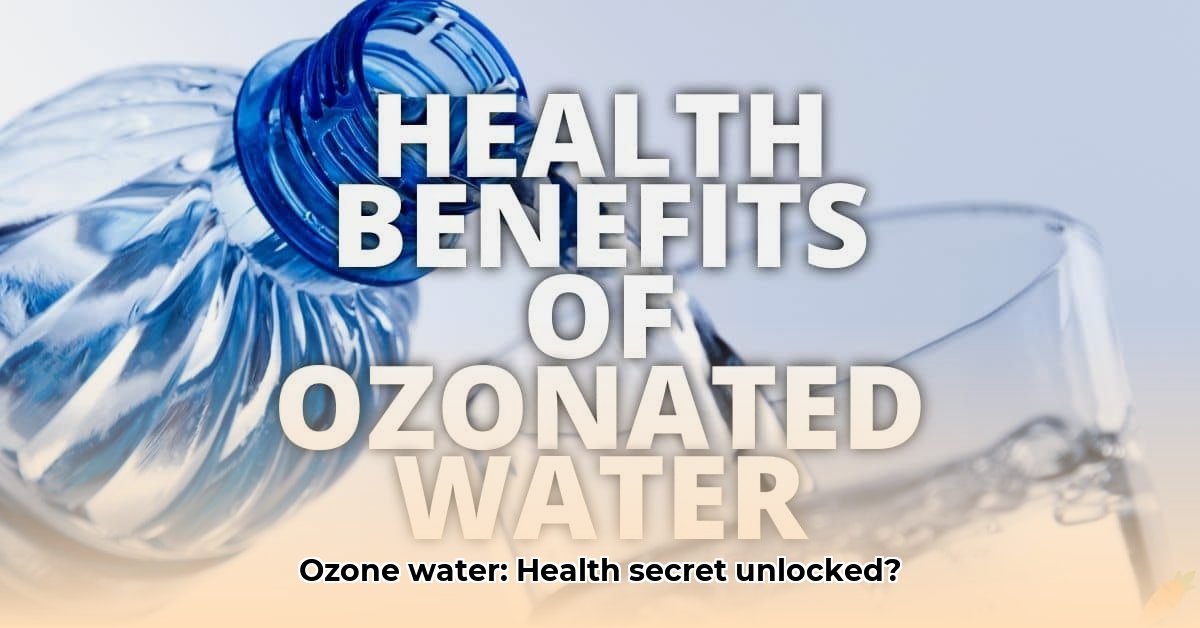
Ozone Water: A Balanced Review of Benefits and Risks
Ozone water, created by bubbling ozone gas into water, has gained popularity due to purported health benefits. However, separating fact from fiction requires a critical evaluation of the existing scientific evidence. While ozone water's effectiveness as a disinfectant is well-established, many therapeutic claims remain unsubstantiated. This review aims to present a balanced perspective, highlighting both the established uses and the limitations of current research regarding ozone water consumption.
Ozone Water's Established Use: Disinfection
One undeniable benefit of ozone water is its potent antimicrobial action. It effectively eliminates bacteria, viruses, and other microorganisms. This property makes it a valuable tool in various applications, including water purification and industrial cleaning. Studies demonstrate its efficacy against harmful bacteria such as Helicobacter pylori (a bacterium linked to stomach ulcers) 1. Is it safe to say that ozone water's disinfectant properties are a significant advantage in maintaining hygiene?
Unproven Health Claims: A Critical Assessment
Numerous websites and marketing materials promote ozone water for various health conditions, including improved digestion, treatment of chronic illnesses like Crohn's disease, and even cancer prevention. However, robust scientific evidence supporting these claims is currently lacking. Many studies are small, underpowered, or use inconsistent methodologies, making it impossible to draw definitive conclusions about the therapeutic benefits of ingesting ozone water. Do these unsubstantiated claims warrant further investigation?
The Current Scientific Landscape: Gaps in Research
The scientific literature on the health effects of drinking ozone water is limited and inconclusive. While its disinfecting capabilities are clear, the long-term effects on human health remain largely unknown. Large-scale, well-designed, and long-term human studies are crucial to determine whether ingesting ozone water offers any therapeutic benefits beyond its established disinfectant properties. What are the significant hurdles in conducting these large-scale studies?
Safety Considerations and Potential Risks
Although the FDA permits the use of ozone in food processing and bottling, potential risks associated with ozone water consumption should be considered. Inhaling ozone gas can irritate the lungs. Moreover, the long-term effects of ingesting ozone water are not fully understood. It is advisable to consult a healthcare professional before incorporating ozone water into your diet, particularly if it is being suggested for any therapeutic purpose.
Navigating Health Claims: A Call for Critical Thinking
Consumers should approach health information critically, evaluating the trustworthiness of sources. It is imperative to distinguish between genuine scientific findings and marketing hype. Skepticism is crucial in navigating the complex information landscape surrounding ozone water. How can consumers approach these claims in a critical fashion?
Key Takeaways: Ozone Water - Benefits and Uncertainties
- Proven benefit: Ozone water is a highly effective disinfectant, eliminating various harmful microorganisms.
- Unproven claims: Claims regarding improved digestion, treatment of chronic illnesses, and cancer prevention lack robust scientific support. Further research is needed.
- Safety concerns: Potential risks and long-term effects of ingesting ozone water are not fully understood. Consult your healthcare provider for guidance.
Recommendations for Future Research and Consumer Behavior
To address the knowledge gap, rigorous, large-scale, long-term clinical trials are needed to evaluate the potential health benefits and risks of ozone water consumption. Until then, consumers should exercise caution and prioritize evidence-based health practices. Standard water purification methods should be considered sufficient for drinking water.